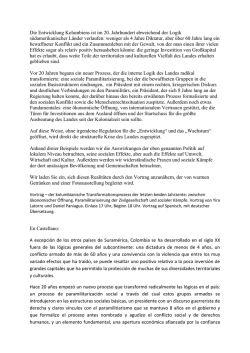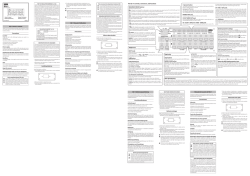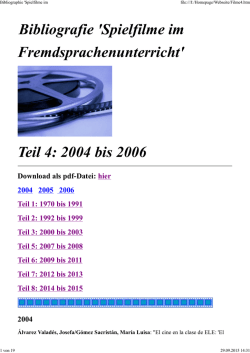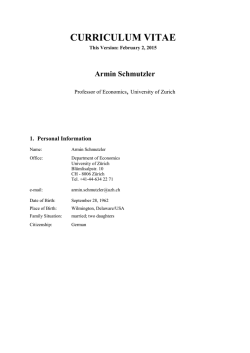
Abstract sheet ABSTRACT SHEET
Abstract sheet ABSTRACT SHEET This abstract sheet may be reproduced without charge. Edwards, Christopher. Global Knowledge: a Challenge for Librarians IFLA Journal 27 (2001) No. 2, p. 65 The benefits of the knowledge society can be realized for the disadvantaged. Information and communication technologies have the potential to support sustainable development. Huge infrastructure investments and access initiatives mean that the majority of the world's population will have telecommunications access in the next 10-15 years. But developing skills and content will be the biggest challenge, and there is real risk of perpetuating the 'digital divide'. The G8 Okinawa Charter on the Global Information Society (2000) and the Global Knowledge Partnership promote initiatives to bridge the digital divide. The library and information profession can make a critical contribution, by providing access, structuring knowledge, imparting information skills, preserving heritage and inspiring trust. But a public relations campaign is needed to raise awareness of what the profession can offer, and to win it a voice in the digital divide debate. Akeroyd, John. The Management of Change in Electronic Libraries IFLA Journal 27 (2001) No. 2, p. 70 Libraries are in a process of fundamental change brought about by radical changes in technology. This paper charts the changes, which have taken place over the years, and makes some assumptions as to how the future will look. The barriers to increased use of technology are analysed and detailed. Finally the paper looks at what managers need to do to bring about these changes and reviews the relevant key issues. Jantz, Ronald C. Technological Discontinuities in the Library: Digital Projects that Illustrate New Opportunities for the Librarian and the Library IFLA Journal 27 (2001) No. 2, p. 74 Our library profession is changing dramatically, largely due to the forces IFLA JOURNAL 27 (2001) 2 unleashed by major advances in computing, networking, and storage technology. We are at a juncture where the library and librarian must ask how they will embrace and use these new technologies. From a business perspective, we know that the three interrelated concepts of competition, technological discontinuities, and innovation are having more and more relevance for the library. This paper suggests that libraries are losing market share and that we can address external threats from competition through unique partnerships and technological innovation. Sharp, Kate. Internet Librarianship: Traditional Roles in a New Environment IFLA Journal 27 (2001) No. 2, p. 78 This paper looks at some of the potential roles that librarians could adopt in the age of the Internet. It will outline the effect that networked information is having on the library profession. It will identify the new roles that information professionals are performing and shows that traditional professional library skills will continue to provide a good foundation for the sector. The paper concludes with a look at how some of the skills we traditionally associate with librarianship have been applied within the Internet environment. Battisti, Michèle. The Future of Copyright Management: European Perspectives IFLA Journal 27 (2001) No. 2, p. 82 The systems of 'droit d'auteur' and copyright, which had established a balance between the users and rights holders on a different level in Europe, are being upset by the development of the digital environment. The volume of legislation is increasing, to the benefit of the rights holders, and in meeting this aim, and in attempting to obey traditional precepts while being concerned to harmonize different legal traditions, complex legal concepts are being created. The landscape presented by this framework will undoubtedly be multiform, and the greater freedom offered by the contractual field is likely, if precautions are not taken at the political level, to harm the users and inhibit the flow of information. Cole, John Y. Literacy, Libraries and IFLA: Recent Developments and a Look at the Future IFLA Journal 27 (2001) No. 2, p. 87 In the past decade educators and librarians have become increasingly concerned about literacy-both the problem of illiteracy and the need to improve and promote literacy among those who already can read. In 1996, IFLA established a Literacy Working Group to recommend what actions IFLA should take regarding literacy. The Working Group's report and recommendations were presented in 1999 and turned over to the IFLA Section on Reading for consideration as part of its Action Plan for 2000-2001. This paper traces IFLA's previous involvement with the issue of literacy, summarizes portions of the IFLA Literacy Working Group's 1999 report, and presents the Section on Reading's immediate plans for promoting literacy and literacy programs in libraries. Fitzgibbons, Shirley A. Libraries and Literacy: a Preliminary Survey of the Literature IFLA Journal 27 (2001) No. 2, p. 91 Presents the results of a search of two major English language databases, Library Literature and Library and Information Science Abstracts for the period 1990-2000 for reports relating to literacy and libraries. Comprises (a) a review of the literature on: the history of literacy; major national and international studies of adult literacy; the role of international agencies; national and international literacy and reading campaigns; book access and funded projects; libraries and literacy, both historically and currently; evaluation reports; guidelines for libraries involved in literacy; and (b) an extensive 'Libraries and Literacy Bibliography' including sections on monographs, resources and websites and periodical articles. 59 Page des sommaires analytiques PAGE DES SOMMAIRES Cette page des sommaires analytiques peut être reproduite sans frais Edwards, Christopher. La Connaissance Globale: un défi pour des bibliothécaires IFLA Journal 27 (2001) No. 2, p. 65 Les avantages de la société de la connaissance peuvent être plus favorables aux publics désavantagés. Les technologies de l'information et de communication permettent le développement constant. Les énormes investissements d'infrastructure et les initiatives sur les accès signifient que la majorité de la population mondiale aura accès à l'information, via des moyens de télécommunications dans les 10-15 prochaines années. Mais les qualifications et le contenu seront le plus grand défi, et il y a vrai risque de perpétuer le " digital divide ". La charte du G8 à Okinawa sur la société globale de l'information (2000) et le Global Knowledge Partnership favorisent des initiatives pour jeter les bases du " digital divide ". Les bibliothécaires et professionnels et d'information peuvent y contribuer concrètement, en fournissant l'accès, en structurant les connaissances, en offrant des qualifications en matière d'information, en préservant l'héritage et en inspirant la confiance. Mais une campagne de relations publiques est nécessaire pour souligner les possibilités que la profession peut offrir, et pour gagner une voix unique dans le débat sur "le digital divide ". Akeroyd, John. La gestion du changement dans les bibliothèques numériques IFLA Journal 27 (2001) No. 2, p. 70 À cause des changements radicaux en technologie, les bibliothèques sont dans un processus de changement fondamental. Ce texte retrace les changements qui ont eu lieu au cours des ans, et fait quelques pronostics sur le futur. Les obstacles à l'usage accru des technologies sont analysés et expliqués. Enfin, ce texte examine ce qu'un gestionnaire doit faire pour apporter de tels changements et fait une revue des points saillants. Jantz, Ronald C. Discontinuités technologiques dans les bibliothèques: projets numériques illustrant de nouvelles opportunités pour les bibliothécaires et les bibliothèques IFLA Journal 27 (2001) No. 2, p. 74 La profession de bibliothécaire s'est transformée dramatiquement grâce aux 60 développements majeurs en informatique, en réseautique et en technologie de stockage des données. Les bibliothèques et les bibliothécaires doivent s'interroger sur l'intégration et l'utilisation des nouvelles technologies. Dans le milieu des affaires, les concepts de compétition, de discontinuités technologiques et d'innovation sont étroitement reliés. Ces concepts sont de plus en plus pertinents pour les bibliothèques. Cet article propose que les bibliothèques perdent une part de marché et que nous pouvons répondre aux menaces extérieures par des associations particulières et des innovations technologiques. Sharp, Kate. La Bibliothéconomie de l'internet : rôles traditionnels dans un nouvel environnement IFLA Journal 27 (2001) No. 2, p. 78 Cette présentation jette un coup d'oeil sur les rôles potentiels que les bibliothécaires peuvent adopter à l'ère de l'internet. Elle mettra en évidence l'effet que l'information en réseau peut avoir sur la profession de bibliothécaire. Elle identifiera les nouveaux rôles que les professionnels de l'information effectuent et montrera que les compétences de la bibliothèque professionnelle traditionnelle continueront de fournir une bonne base pour le secteur. La présentation se termine en jetant un coup d'oeil sur la manière d'associer quelques habilités de la bibliothéconomie en les appliquant dans l'environnement d'internet. Battisti, Michèle. L'avenir de la gestion des droits d'auteur en Europe IFLA Journal 27 (2001) No. 2, p. 82 Les systèmes de droit d'auteur et de copyright qui avaient établi un équilibre entre les usagers et les ayants droit sur un plan différent en Europe, sont bouleversés par le développement de l'environnement numérique. L'appareil législatif s'accroît, au bénéfice des ayants droit et crée, pour répondre à cet objectif, obéir aux préceptes anciens et au souci d'harmonisation entre des traditions juridiques différentes, des concepts juridiques complexes. Le paysage offert dans ce cadre sera sans doute multiforme et la liberté plus grande procurée par le domaine contractuel risque, si des précautions ne sont pas prises au niveau politique, de léser les utilisateurs et de freiner la circulation de l'information. Cole John Y. Instruction, bibliothèques et IFLA :Développements récents et un regard vers le futur. IFLA Journal 27 (2001) No 2, p. 87 Au cours des dix dernières années, les éducateurs et les bibliothécaires se sont sentis de plus en plus concernés par l'instruction. Il s'agissait de faire face à la fois au problème de l'analphabétisme et la nécessité d'améliorer et de favoriser l'instruction parmi ceux qui savent déjà lire. En 1996, IFLA a établi un groupe de travail sur l'instruction pour déterminer quelles actions IFLA devrait prendre à ce sujet. Le rapport et les recommandations de ce groupe de travail ont été présentés en 1999 ; les actions étaient alors renvoyées vers la Section d'IFLA sur le thème de la lecture pour une prise en compte dans le cadre de son plan d'action pour 2000-2001. L'article trace les initiatives précédentes d'IFLA concernant la question de l'instruction, récapitule des parties du rapport du groupe de travail " IFLA Literacy " fait en 1999 et présente les projets actuels de la Section sur la lecture de concernant la promotion de l'instruction et la lecture ainsi que les programmes correspondant dans les bibliothèques. Fitzgibbons, Shirley A. Bibliothèques et instruction: une étude préliminaire de la littérature IFLA Journal 27 (2001) No. 2, p. 91 L'article présente les résultats d'une recherche dans deux bases de données anglo-saxonnes Library Literature and Library and Information Science Abstracts, pour la période 1990-2000, sur des rapports concernant l'instruction et les bibliothèques. Il comporte une étude de la littérature sur l'histoire de l'instruction ; les principales études nationales et internationales concernant l'instruction d'adulte ; le rôle des agences internationales ; les campagnes d'instruction et de lecture nationales et internationales, l'accès au livre et projets subventionnés ; les bibliothèques et l'instruction, du point de vue historique et actuel ; les rapports d'évaluation ; les directives pour des bibliothèques impliquées dans l'instruction. Une riche bibliographie sur ces questions comprend des parties composantes des monographies, d'autres ressources et des sites internet ainsi que des articles de périodiques. IFLA JOURNAL 27 (2001) 2 Inhaltsfahne INHALTSFAHNE Diese Inhaltsfahne kann gebührenfrei vervielfältigt werden Edwards, Christopher. Globales Wissen: eine Herausforderung für Bibliothekare. IFLA Journal 27 (2001) No. 2, S. 65 Die Segnungen der Wissensgesellschaft können auch auf die Benachteiligten übertragen werden. Informations- und Kommunikationstechnologien haben das Potential, eine permanente Entwicklung zu unterstützen. Große Investitionen in die Infrastruktur und Bereitstellungsmaßnahmen sorgen dafür, dass die Mehrheit der Weltbevölkerung in den nächsten 10-15 Jahren. Telekommunikationsverbindungen besitzt. Doch die Entwicklung von Fertigkeiten und Inhalten wird die größte Herausforderung sein, und es besteht die wirkliche Gefahr, dass die "digitale Trennung" fortbesteht. Die Okinawa Charter der G 8 über die Globale Informationsgesellschaft (2000) und die Globale Partnerschaft des Wissens fordert Initiativen, die digitale Trennung zu überwinden. Der Berufsstand der Bibliothekare und Informationsfachleute kann hierzu einen kritischen Beitrag leisten, indem er für den Zugang sorgt, das Wissen strukturiert, Informationsfertigkeiten vermittelt, das kulturelle Erbe schützt und Vertrauen aufbaut. Es bedarf jedoch einer Public Relationskampagne, um das Bewusstsein zu wecken, was der Berufsstand leisten kann und ihm eine Stimme in der Debatte um die digitale Trennung zu geben. Akeroyd, John. Die Bewältigung des Wandels in elektronischen Bibliotheken. IFLA Journal 27 (2001) No. 2, S. 70 Bibliotheken befinden sich in einem Prozess des grundlegenden Wandels, der durch eine radikale Veränderung in den Technologien hervorgerufen worden ist. Dieser Beitrag listet die Veränderung auf, die sich über die Jahre ereignet haben und gibt einige Prognosen, wie die Zukunft aussehen wird. Die Hindernisse gegenüber einer stärkeren Verwendung neuer Technologien werden analysiert und ausführlich behandelt. Schließlich betrachtet das Papier, was Manager tun müssen, um diese Veränderungen zu bewirken und gibt einen Überblick über die wesentlichen Punkte. Jantz, Ronald C. Technologische Brüche in der Bibliothek: Digitale Projekte, die neue Möglichkeiten für den Bibliothekar und die Bibliothek illustrieren IFLA Journal 27 (2001) No. 2, p. 74 Die Begriffe Konkurrenz, technologische Brüche und Innovation werden typi- IFLA JOURNAL 27 (2001) 2 scherweise im Bereich der Wirtschaft verwendet, dennoch können diese Begriffe auch sehr nützlich sein, wenn man die gegenwärtige Praxis der Bibliotheken untersucht und neue Richtungen und Chancen erkennt. Obwohl sich mein Rahmen hier auf die Universitäts- und Forschungsbibliothek beschränkt, glaube ich, dass diese Begriffe für alle Bibliotheken relevant werden. Sharp, Kate. Die Arbeit des Bibliothekars mit dem Internet: traditionelle Rollen in einer neuen Umgebung. IFLA Journal 27 (2001) No. 2, S. 78 Dieser Beitrag betrachtet einige potentielle Rollen, die Bibliothekare im Zeitalter des Internets annehmen können. Er wird den Einfluss skizzieren, den Information aus dem Netz auf den Beruf des Bibliothekars hat. Er identifiziert die neuen Rollen, die Informationsfachleute ausüben und zeigt, das traditionelle bibliothekarische Fertigkeiten weiterhin eine gute Grundlage für diesen Sektor bilden. Der Beitrag schliesst mit einem Blick darauf, wie einige der Fertigkeiten, die wir traditionell mit dem bibliothekarischen Beruf in Verbindung bringen, auf den Bereich des Internets übertragen worden sind. Battisti, Michele. Die Zukunft des Urheberrechtsmanagements: Europäische Perspektiven. IFLA Journal 27 (2001) No. 2, S. 82 Die Systeme des "droit d'auteur" und des Urheberrechts, die ein Gleichgewicht zwischen den Benutzern und den Rechtsinhabern auf verschiedenen Ebenen herstellen, werden durch die Entwicklung der digitalen Komponente aus dem Gleichgewicht gebracht. Der Umfang der Gesetzgebung nimmt zu, zugunsten der Inhaber der Rechte und in dem Bemühen, dem Ziel näherzukommen und traditionellen Regeln zu folgen und gleichzeitig unterschiedliche Rechtstraditionen zu harmonisieren, werden komplexe rechtliche Konzepte geschaffen. Die Landschaft, die in diesem Rahmen entsteht, wird ohne Zweifel vielgestaltig sein und die größeren Freiheiten, die im Bereich der Verträge angeboten werden, werden wahrscheinlich dazu führen, dass die Benutzer Nachteile hinnehmen müssen und der Fluss der Information behindert wird, wenn keine Regulierung auf der politischen Ebene stattfindet. Cole, John Y. Alphabetisierung, Bibliotheken und IFLA: neuere Entwicklungen und ein Blick in die Zukunft. IFLA Journal 27 (2001) No. 2, S. 87 Während des letzten Jahrzehnts haben sich Lehrkräfte und Bibliothekare in zunehmenden Maße um die Alphabetisierung Sorgen gemacht, sowohl um das Problem des Analphabetismus als auch um die Notwendigkeit, die Alphabetisierung unter denjenigen zu verbessern und zu fördern, die schon lesen können. Im Jahre 1996 gründete IFLA eine Arbeitsgruppe für Alphabetisierung, um die Organisation hinsichtlich Alphabetisierungsmaßnahmen zu beraten. Der bericht der Arbeitsgruppe und die Empfehlungen wurden 1999 vorgestellt und der IFLA-Sektion Lesen übergeben als Teil ihres Aktionsplans für die Jahre 2000 - 2001. Dieser Beitrag verfolgt IFLA's bisheriges Engagement in der Angelegenheit der Alphabetisierung, fasst Teile des Berichtes der IFLAArbeitsgruppe von 1999 zusammen und stellt die daraus resultierenden Pläne der Sektion Lesen für die Forderung der Alphabetisierung und Alphabetisierungsprogramme in Bibliotheken vor. Fitzgibbons, Shirley A. Bibliotheken und Alphabetisierung: ein vorläufiger Überblick über die Literatur. IFLA Journal 27 (2001) No. 2, S. 91 Der Beitrag stellt die Ergebnisse einer Suche in zwei bedeutenden englischsprachigen Datenbanken vor, Library Literature und Library und Information Science Abstracts für den Zeitraum 1990 - 2000 hinsichtlich Berichten, die sich auf die die Alphabetisierung und Bibliotheken beziehen. Er enthält (a) einen Überblick zur Literatur über die Geschichte der Alphabetisierung, bedeutendere nationale und internationale Studien zur Alphabetisierung, bei Erwachsenen, die Rolle von internationalen Verbänden, nationale und internationale Alphabetisierungs- und Lesekampagnen, Versorgung mit Büchern und finanziell unterstütze Projekte die Rolle der internationale Alphabetisierung, sowohl historisch als auch gegenwärtig, die Evaluation von Berichten, Richtlinien für Bibliotheken, die im Bereich der Alphabetisierung arbeiten und (b) eine ausführliche Bibliographie zum Thema Bibliotheken und Alphabetisisierung einschließlich Abschnitten zu Monographien, Quellen, Internetseiten und Artikeln in Zeitschriften. 61 Página de resúmenes PÁGINA DE RESÚMENES Se puede reproducir esta página de resúmenes sin gastos Edwards, Christopher. Conocimiento global: un desafío para los bibliotecarios IFLA Journal 27 (2001), N. 2, p. 65 Los beneficios de la sociedad del conocimiento pueden repercutir en los que están en situación de desventaja. Las tecnologías de la información y la comunicación tienen capacidad para mantener el desarrollo sostenible. La mayor parte de la población mundial tendrá acceso a las telecomunicaciones en los próximos 10-15 años gracias a formidables inversiones en infraestructuras e iniciativas orientadas al acceso. El principal obstáculo, sin embargo, será el desarrollo de destrezas y contenidos, existiendo un riesgo real de que la "brecha digital" se perpetúe. La Carta de Okinawa del Grupo de los Ocho sobre la Sociedad Global de la Información (2000) y la Sociedad para el Conocimiento Global promueven iniciativas para tender puentes contra la citada brecha digital. Los profesionales de las bibliotecas y la información pueden hacer una importante contribución proporcionando acceso, estructurando el conocimiento, trasmitiendo sus destrezas en información, preservando el patrimonio e inspirando confianza. Es necesaria, no obstante, una campaña de relaciones públicas para que se conozca mejor lo que dichos profesionales pueden ofrecer y puedan hacerse oir en el debate sobre la brecha digital. Akeroyd, John. La Administración del Cambio en las Bibliotecas Electrónicas IFLA Journal 27 (2001) No. 2, p. 70 Las bibliotecas están en un proceso de cambio fundamental impulsado por cambios radicales en la tecnología. Esta ponencia esboza los cambios, los cuales han tomado lugar a través de los años y formula algunas hipótesis de cómo se verá el futuro. Las barreras para el uso incrementado de tecnología son analizadas y detalladas. Finalmente la ponencia avisora lo que los administradores necesitan hacer para llevar a cabo estos cambios y revisa los asuntos relevantes clave. Jantz, Ronald C. Las discontinuidades tecnológicas de la biblioteca: proyectos digitales que ilustran las nuevas oportunidades para el bibliotecario y la biblioteca IFLA Journal 27 (2001) No. 2, p. 74 Nuestra profesión de bibliotecarios está sufriendo cambios cruciales, principal- 62 mente debido a las fuerzas desencadenadas por los principales avances en la informática, las redes y la tecnología del almacenamiento. Hemos llegado a un punto en el que la biblioteca y el bibliotecario deben preguntarse cómo asimilarán y utilizarán estas nuevas tecnologías. Desde un punto de vista empresarial, sabemos que los tres conceptos interrelacionados de competencia, discontinuidades tecnológicas e innovación tiene cada vez más importancia para la biblioteca. Este artículo sugiere que las bibliotecas están perdiendo cuota de mercado y que podemos enfrentarnos a las amenazas externas de la competencia mediante sociedades singulares e innovación tecnológica. Sharp, Kate. Biblioteconomía en Internet: papeles tradicionales en un entorno nuevo IFLA Journal 27 (2001) No. 2, p. 78 Este trabajo contempla algunos de los roles posibles que podrían adoptar los bibliotecarios en la era de Internet. Esbozará el efecto que sobre la profesión bibliotecaria está teniendo la información en red. Identificará los nuevos roles que los profesionales de la información están desempeñando y muestra que las habilidades bibliotecarias tradicionales continuarán proporcionando una buena base para el sector. El trabajo concluye con un vistazo sobre cómo han sido aplicados en Internet algunas de las habilidades que tradicionalmente asociamos con la biblioteconomía. Batisti, Michele. El futuro de la gestión del derecho de autor: puntos de vista europeos IFLA Journal 27 (2001), N. 2, p. 82 Los ámbitos del "derecho de autor" y del copyrigth, donde se había establecido un equilibrio entre los usuarios y los titulares de los citados derechos, están siendo alterados por el desarrollo del entorno digital. La legislación al respecto aumenta para beneficio de quienes detentan los citados derechos, a la vez que el afán por intentar armonizar unas tradiciones jurídicas diferentes está creando figuras jurídicas complejas. El panorama que se ofrece va a ser sin duda variado y, si no se toman las debidas precauciones a nivel político, las mayores libertades que se ofrecen en la esfera contractual podrían perjudicar a los usuarios y frenar el flujo de la información. Cole, John Y. Alfabetización, bibliotecas e IFLA: realizaciones recientes y una mirada al futuro IFLA Journal 27 (2001), N. 2, p. 87 Durante la última década, educadores y bibliotecarios han mostrado una creciente preocupación por la alfabetización, referida tanto al problema del analfabetismo como a la necesidad de promover la lectura en aquellos que ya saben leer. En 1996, la IFLA estableció un Grupo de Trabajo sobre Alfabetización para que le asesorara sobre las acciones que la IFLA debería emprender en este terreno. Este Grupo de Trabajo presentó en 1999 un informe y unas recomendaciones, que se remitieron a la Sección de Lectura de la IFLA para que las incluyera en su Plan de Acción 2000-2001. Este artículo describe las actuaciones de la IFLA en el campo de la alfabetización llevadas a cabo en el pasado, resume algunas partes del informe de 1999 del Grupo de Trabajo de la IFLA sobre Alfabetización y muestra los últimos planes de la Sección de Lectura para promover la alfabetización y los programas de lectura en las bibliotecas. Fitzgibbons, Shirley A. Bibliotecas y alfabetización: estudio introductorio de la bibliografía IFLA Journal 27 (2001), N. 2, p. 91 Este artículo presenta los resultados de una búsqueda de informes sobre alfabetización y bibliotecas durante el período 1990-2000 efectuada en dos importantes bases de datos en inglés: Library Literature y Library and Information Science Abstracts. Se tratan los siguientes aspectos: a) examen de la bibliografía sobre la historia de la alfabetización, principales estudios nacionales e internacionales sobre alfabetización de adultos, papel de las agencias internacionales, campañas nacionales e internacionales de alfabetización y lectura, acceso al libro y proyectos con financiación, bibliotecas y la alfabetización tanto su historia como la situación actual-, informes de evaluación y directrices para bibliotecas implicadas en la alfabetización; b) una completa "Bibliografía sobre Bibliotecas y Alfabetización", con secciones diferenciadas para monografías, recursos y sitios Web y artículos de revistas. IFLA JOURNAL 27 (2001) 2 Peseo`qz pq`qeÐ Peseo`qz pq`qeÐ IFLA JOURNAL 27 (2001) 2 63
© Copyright 2026




